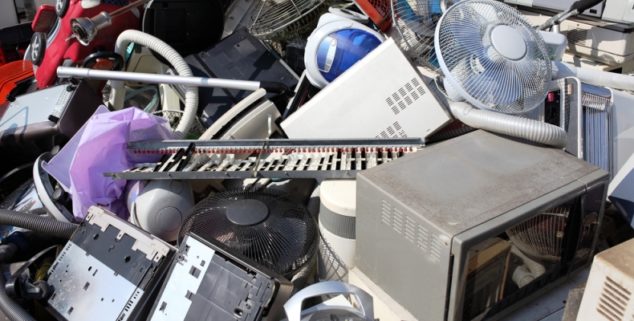Opinion
The essential reality and necessity of environmental justice
 Metal and plastic household appliances, including electronic gear, ready for recycling. (Photo: akiyoka, via Shutterstock)
Metal and plastic household appliances, including electronic gear, ready for recycling. (Photo: akiyoka, via Shutterstock)The term “environmental justice” — or EJ, for short — has recently gained widespread usage among the general public. Do you know what it means?
At the heart of it is that our most disadvantaged communities and neighborhoods have historically been disproportionately impacted by industrial pollution, toxic waste and air emissions that adversely affect the health and well-being of residents in those areas.
California people and businesses produce many tons of scrap metal every day — enough to fill a football stadium – and millions of tons per year.
There is simply no reasonable argument about these impacts. Study after study has documented that disadvantaged and minority communities have inordinately suffered from society’s pollution for decades. I grew up in Watts, so I have lived this experience in my own life.
But it’s not just air, water and ground pollution that unequally affects disadvantaged communities. These same communities can also be disproportionately affected by the dumping of cast offs, including metal-containing products that have reached their end of life, or that have been damaged or abandoned.
This includes everything from old cars to defunct household appliances, from tables and chairs to bed frames and bicycles. Many of the end-of-life cars and appliances have their last life in poor areas and from there become cast offs.
California people and businesses produce many tons of scrap metal every day — enough to fill a football stadium – and millions of tons per year. This includes more than a million vehicles and millions of appliances such as refrigerators, dishwashers, ovens, washers and dryers, etc.
Fortunately, most of these millions of tons of scrap metal are processed by California’s metal-recycling industry. If you tour one of these facilities, as I have, you can observe that the metal is physically shredded by machines in a process that does not use heat, gases, chemicals, or any other materials that could be considered toxic or otherwise hazardous. Instead of being allowed to litter our streets, alleys and vacant lots, the recovered metal is used as raw material to make new cars, appliances, and other consumer items.
I was surprised to learn that 70 percent of new metal made in the United States comes from recycled metals.
How does the scrap metal get to these metal-recycling plants? This may surprise you, but a lot of it is delivered by thousands of scrap-metal collectors in mostly disadvantaged communities and neighborhoods throughout the state. These hard-working, self-starting Californians — a majority of whom are Latino and Black — earn a living and support their families by collecting scrap metal in their own neighborhoods. They then sell the collected scrap metal to local metal-recycling plants.
In many places, entire families are involved in what is basically a family business, spanning several generations.
In addition to providing good livelihoods to people in EJ communities, this scrap-collection activity is critical for keeping these neighborhoods clean and free of metal cast-offs that would otherwise pile up and endanger public health and safety. In this sense, the term EJ could also stand for “environmental jobs.”
The fact is, working-class communities like mine that are most affected by environmental-justice issues have long embraced a culture of recycling as a way to keep their neighborhoods clean. More affluent areas, whether they know it or not, also benefit by having their scrap metal picked up by collectors who make a living doing so.
As our state environmental agencies finally are beginning to prioritize the protection of our disadvantaged communities in the name of environmental justice – and addressing the sources of pollution in those areas – they should keep in mind that metal recycling is part of the answer, not the problem.
An environmental disaster would occur if the tons of scrap metal produced every day in California had nowhere to go — and much of it ended up as additional blight in our already most disadvantaged communities. That would not be justice of any sort.
Metal recycling not only provides thousands of jobs for mostly minority Californians, it also helps keep our disadvantaged communities cleaner and safer at the same time. Both the jobs and the recycling are also an essential part of environmental justice.
Take it from me.
—
Editor’s Note: The Rev. Mac Shorty, a former Methodist minister, is founder of the Community Repower Movement and former vice chair of the Watts Neighborhood Council. He still lives in Watts.
Want to see more stories like this? Sign up for The Roundup, the free daily newsletter about California politics from the editors of Capitol Weekly. Stay up to date on the news you need to know.
Sign up below, then look for a confirmation email in your inbox.

Leave a Reply